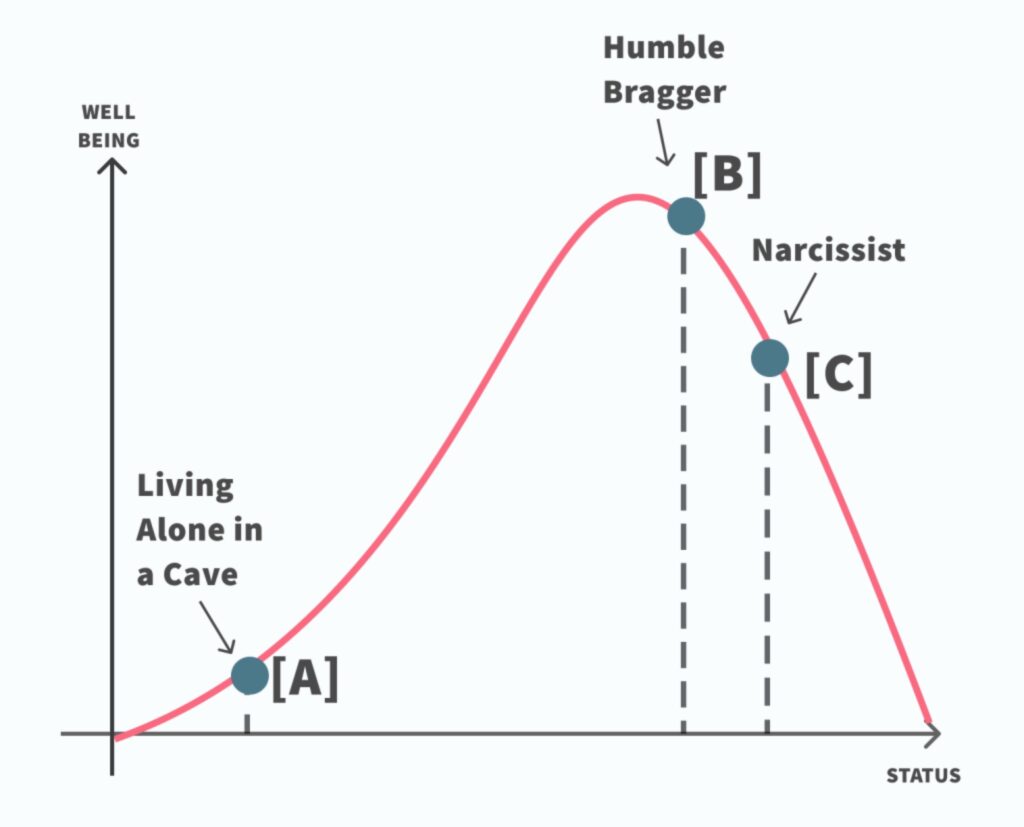
What You'll Learn...
- The hidden benefits and pitfalls of engaging in status games as an entrepreneur.
- How to discern which status games are worth your time and energy.
- Strategies for maintaining authenticity while navigating the landscape of status and success.
- Practical steps to align status games with your core values and business goals.
- The impact status games can have on your personal brand and company's growth.
Everyone is playing a status game
No one wants to admit they’re playing status games, but we all play them.
Ever negotiated a specific job title? – that’s a status game.
Ever decided on the perfect books for the background of your Zoom calls – status game.
Having a body that says, “I go to the gym A LOT” – another status game.
Perfectly manicured nails – status game.
It’s worse for founders.
In a world where the flash of a Rolex, the gleam of a Tesla, and the stories of venture capital glory dominate the entrepreneurial landscape, it’s way too easy to get caught up in the game of status.
We’re constantly bombarded with symbols of success that society tells us we need to chase. And there’s a thousand of them.
But here’s the worst part. Status games can actually be helpful for founders.
Believe me, I hate it more than you do. When I started researching this topic, I wanted nothing more than to find out that status games are a complete waste of time. Turns out they’re not if you choose the right ones to play.
I wanted nothing more than to find out that status games are a complete waste of time. Turns out they’re not
The allure of status: a double-edged sword
As entrepreneurs, we’re inherently driven by a desire to succeed to make our mark on the world.
This drive propels us forward, fuels late nights, and sparks innovation. However, it also makes us susceptible to the allure of status games.
These games are pervasive, infiltrating our professional networks, social media feeds, and self-perception.
They’re not inherently bad; recognition and accolades can open doors, attract clients, and build credibility. But when our sense of worth and direction becomes too entangled with external validation, we risk losing sight of our true purpose and values.
I’m always shocked when I read the Tao Te Ching, written 2,500 years ago, and how relevant it is for founders today:
Fill your bowl to the brim
and it will spill.
Keep sharpening your knife
and it will blunt.
Chase after money and security
and your heart will never unclench.
Care about people’s approval
and you will be their prisoner.
Chase after money and security
and your heart will never unclench
Humans are inherently motivated to excel, whether it’s to be the most proficient Crossfit enthusiast, the most eloquent writer, the most caring parent, the most considerate neighbor, the most gracious host at dinner parties, or the most effective CEO.
We experience a sense of satisfaction when we impress people and feel a profound sense of loss when our status is diminished.
It’s natural, it can drive us to success, but it still kind of sucks.
From my perspective, the critical question isn’t whether we engage in status games—they’re a fundamental aspect of human interaction—but how we choose to play them.
It’s about finding a way to navigate these waters with intention, leveraging status when it aligns with our values and the impact we want to make without letting it define us or detract from our authenticity.
The benefits of status games for entrepreneurs
In the competitive landscape of the business world, status is important.
- Skilled employees go to more prestigious companies to “build their career.”
- Companies get more funding based on their clout.
- Founders can drum up more business by being invited to speak at events.
Everywhere around you, status games are being played.
This isn’t solely about the prestige of being featured in top-tier business magazines or speaking at high-profile conferences. It’s about using these opportunities to strengthen your reputation and signal the importance of your venture. Recognition like this opens doors to partnerships, funding, and talent that might have otherwise been inaccessible.
The problem is, if you don’t pick the right ones, you’ll waste a lot of time and possibly look really dumb.
No one else can be more you than you. Staying true to yourself is a game you’ve already won
How to choose the status games you play
If you’re going to sift through the noise of status games and zero in on the ones that will make a difference, you need to get intentional about it. Grab a piece of paper, we’re going to do some writing.
Step 1. Dig deep: what’s your why?
First up, let’s get introspective. What drives you? Is it shaking up the industry, building a cult brand, or maybe creating a workplace that feels more like a family?
Writing down your core values and big-picture goals first isn’t just fluff; it will keep you authentic, putting you in the right headspace so you choose the status games that resonate with your mission.
Step 2. Write down any status games you’re playing or thinking of playing
Alright, now we’re going to create a chart with 5 columns:
Status Game – Impact – Cost – Community – Authentic to me
Write down each status game in its own row. Having trouble coming up with status games that are being played by founders? Here are 20 to get you started.

Step 3. Impact over impressions
Now, let’s talk about impact. Before you jump into any status game, ask yourself: “Will winning this actually move the needle for my business?”
We’re talking real outcomes here — think strategic partnerships, talent attraction, or market penetration. Not “I might get invited to a really cool event.”
If a status symbol doesn’t directly contribute to your growth or open meaningful doors, it might be a distraction disguised as an opportunity. Write down what impact the status games you’re looking at could have on you or your business.
Step 4. Count the cost
Every status game comes with a price tag: your time, energy, or cold hard cash. Do the math and figure out if the potential ROI justifies the investment. If you find yourself pouring resources into a game with dubious returns, it’s time to rethink your strategy.
Remember, every minute you spend chasing status is a minute not spent on perfecting your product or delighting your customers.
Write down the costs for each status game.
Step 5. Networks and communities matter
Consider the community and connections that come with each status game. Are these the movers and shakers you want to rub elbows with? Winning in a game that connects you with like-minded founders, mentors, and potential collaborators is a strategic move. It’s not just about the status itself but about embedding yourself in ecosystems that foster growth, innovation, and mutual support.
Write down the communities or people you want to reach through the status game.
Step 6. Keep it real
Finally, in an era where authenticity is the ultimate currency, the status games you play should feel genuine to you and your brand.
Here’s the inherent problem with status games.
- If you want to be smart, there will always be someone smarter than you.
- If you want to be attractive, there will always be someone more attractive than you.
- If you want to be rich, there will always be someone richer than you.
But no one else can be more you than you. Staying true to yourself is a game you’ve already won.
Being authentic is how you win the game. And here’s how I judge it: If it feels like putting on a costume every time you engage in a certain game, it’s probably not for you.
For each status game, write down how you would do it in a way that is authentically you. If you can’t find an answer, move on.
So, where do you go from here?
When I began my research on status games, I was sure that I’d find status games bad and should be avoided at all costs.
Shocked as I was, I realized that they can’t be avoided and honestly can sometimes be beneficial.
But let’s just be honest about it.
Know what you’re doing and why, and it becomes authentic to you.
And just so you don’t go too far, I created a little chart that you can use at home:

This chart is not scientifically sound at all, but it feels right to me. Just know once you get to the point of humble bragging, you’ve gone too far.
If you can play status games authentically and intentionally, it will be a positive thing for both you and your business.
-

Khe Hy is a recovering finance dude who now surfs and ponders existential questions all day. Khe writes the RadReads newsletter and hosts The Examined Life podcast.
View all posts



